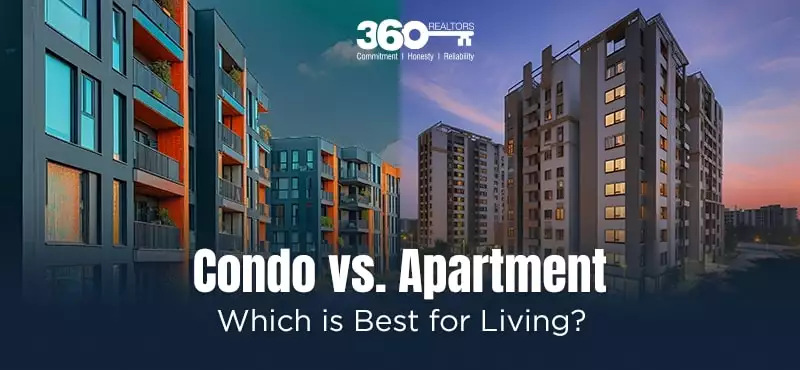Investors and property buyers often look out for the key differences between apartments and condos. While both are popular in the property market in India and yield decent returns on price appreciation, it’s imperative to understand what each means. In this guide, we have compared condo vs apartment, discussing the differences.
We have also discussed what investing in any of these two types of properties implies for buyers. So, read on to make an informed decision before finalizing your decision.
Before discussing the difference between condo and apartment, let’s take a look at what these two types of properties mean.
A condominium, or condo, is a part of a gated community. It is a large residential complex that includes several units to live in. These units are referred to as condos. The owner of condos doesn’t own the land on which the complex is built. However, the person only owns the residential unit, or condo.
The residential units are demarcated clearly and come with several amenities. These include fitness centres, swimming pools, clubhouses, and parks. Modern condos come with several other amenities to enhance the lifestyle of its residents. These facilities usually foster a sense of community living.
The standard size of a condo apartment in India ranges from 600 to 1,000 Sq.Ft. In large cities like Mumbai, the prices of condos can be as high as INR 1.5 crore, while they start from INR 90 lakh on average.
However, the concept of condos isn’t simply limited to residential properties. The commercial real estate market in India has also witnessed the development of condo office spaces in large numbers. Particularly, this property segment has gained traction in the last few years.
Apartments occupy only a part of a building and these are self-contained residential units. You may purchase an apartment for residing personally or use it for commercial purposes by putting it on rent. Usually, a property management team is responsible for maintaining an apartment. This group is located in a residential complex, building, or community.
Depending on the agreement, a residential apartment may be unfurnished or furnished. The number of bedrooms in a residential apartment varies based on the configurations. This can be 1, 2, 3, 4, or 5 BHK, or even larger.
The standard size of a residential apartment in Delhi NCR is 900 to 1,200 Sq. Ft, and these properties usually come in 3 BHK configurations. The cost of a condo of this size ranges from INR 80 lakhs to INR 90 lakhs.
Also Read | Flat vs Apartment
Now that you know what these types of properties imply, let’s check out the key difference between condo and apartment.
The ownership structure of a condo and an apartment marks the biggest difference. An apartment is a residential property that you can put on rent. Often, apartments are a part of a larger building.
In this context, a condo can be similar to an apartment. Usually, these are small units housed within a big residential building. However, condos cannot be rented, they have to be owned. The property owner shells out the tax for a condo, while the landlord pays the same for an apartment. If an apartment is rented out, the tenants don’t have to pay any tax. They, instead, pay the rent to the landlord.
While exploring the difference between apartment and condo, you might notice that the structure of apartment and condo communities is somewhat similar. The locations and amenities may also be close for these two types of properties. Even both residential apartments and condos offer amenities like trash disposal, swimming pool, open spaces, gardens, gyms, and play areas for kids.
However, you should note that a condo owner is building equity as the person has to pay dues on a monthly basis to the homeowners association (HOA). He or she is also responsible to carry out all the internal maintenance tasks.
On the other hand, an apartment renter simply needs to pay rent every month. The person doesn’t build equity in any way. Renters need to depend on the landlord in case any maintenance is required.
Therefore, condos and apartments provide housing options in buildings having multiple units. These properties are available with separate features catering to a wide range of lifestyles and preferences. While comparing apartment vs condo, it’s imperative to understand how they differ from one another.
Let’s have a look at these differences in detail.
Condos
As explained, condos are residential or commercial units housed in larger building complexes. These units are owned individually, with owners holding the legal title to their respective units. The common areas in the complex like lobbies, elevators, and other facilities come under shared ownership. When you own a condo, you need to become a member of the homeowners' association (HOA). Thus, you will be responsible for enforcing regulations and managing communal spaces.
Apartments
Apartments are owned by a landlord or single entity. These properties are residential units in a building. Owners can personally reside in these properties or lease them out to tenants for a predetermined period. Typically, this is calculated on a monthly or annual basis in exchange for rent. While condo owners hold the legal right to their properties, apartment dwellers don’t possess any ownership rights over these living areas once they are rented out. They need to adhere to the terms outlined in the lease or rent agreements.
Condos
Legal documents like the Declaration of Condominium and the Association Bylaws govern the ownership of condos. These laws outline the responsibilities, rights, and norms that the residential unit owners need to follow. These documents outline the framework on the basis of which the condominium complex will be managed. They might include certain clauses related to assessments, maintenance, or resolving disputes.
Apartments
The relationship between tenants and landlords in apartment buildings is regulated by leases or rental agreements. Here, specific terms are laid out on the amount of rent to be paid, duration of occupancy, and termination conditions. Landlords are responsible to control residential units and take care of property maintenance. They also adhere to the laws governing the relation with tenants.
Condos
The owners of condos are responsible for repairing and maintaining their respective units. However, some areas come under shared ownership. These areas are maintained and managed by the HOA. The necessary funding comes from special assessments of monthly dues, and is collected from the unit owners. This way, owners can stay abreast of the upkeep cost of the common spaces and contribute to the fund accordingly.
Apartments
The landlord or property management company shoulders the responsibility to carry out necessary maintenance and repair in apartments. So, if an apartment is rented out, the tenant doesn’t have any responsibility to carry out structural maintenance or major repairs. In case of any damage or issue, they need to inform the owner directly to get it resolved. This arrangement proves to be convenient to both the landlord and the tenant, each knowing their clear roles regarding property maintenance.
Condos
While comparing condo vs apartment, it’s imperative to understand your financial considerations. When you purchase a condo, the process involves a sizable upfront cost. This includes the closing costs, down payment, and ongoing HOA fees.
However, owning a condo provides you with the opportunity to accumulate home equity. This way, you can benefit from the property value appreciation in future. Besides, property owners reserve the right to get their residential units customized as per their preferences.
Apartments
When you rent an apartment, the upfront financial commitment is limited. Since you don’t own the property, you need not pay for costs involving property taxes, down payment, HOA fees, and insurance. Thus, you are relieved from the risks associated with owning a home. This brings you more flexibility while managing your funds.
However, living in a rented apartment deprives you of the long-term financial benefits like building home equity that you enjoy while owning a property.
5. Freedom and Flexibility
Condos
In condos, residents cherish a higher degree of control and autonomy over their property and living environment. Being an owner, you can modify your residential units while adhering to the regulations of the HOA. You may also rent out the property to tenants to earn monthly rent. Thus, this is a flexible arrangement where you can experience flexibility in your lifestyle and the perks of owning a property.
Apartments
Individuals who own an apartment enjoy some degree of flexibility while choosing the duration of the lease. Thus, you can relocate easily without experiencing the constraints of owning a property, considering the intangible nature of the assets. Tenants can also explore different neighbourhoods and housing options. They need not commit to a long-term mortgage, which brings in more flexibility. This is particularly advantageous to families with uncertain plans in the future or those leading dynamic lifestyles.
Also Read | Top 10 Best Cities to Live in India
We have discussed the difference between condo and apartment for your understanding. Now, let’s take a look at whether you should buy a condo or an apartment.
Pros of living in an apartment
• If you aren’t ready to bear the expense of owning a home, it’s wise to get a rented apartment.
• Also, if you are relocating your city frequently for professional commitments, go for a rented apartment rather than owning a condo.
• Being a tenant, you need not shell out any major expense for maintenance. The landlord will be responsible for maintaining the property, while you live in it. Make sure to check the rent or lease agreement to know your obligations.
• Generally, apartment communities are located close to the central zones in major cities. This ensures easy access to shops, restaurants, and multiplexes.
Cons of Living in an Apartment
• While some apartment complexes offer a recreational area of pool, condos come with many more amenities.
• Living in a rented apartment prevents you from building equity in your property.
• Since you don’t have any control over your living environment, you may experience disturbances like noise or traffic chaos.
Also Read | List of Top 10 Smart Cities in India
Considering single-family homes, a condo can be more affordable as an entry point to the property market.
Pros of living in a condo
• Being the property owner, you will enjoy the accumulation of home equity over time.
• Condo owners also get tax benefits that tenants are deprived of.
• The HOA will take care of property maintenance, so you need to put on limited efforts on the coordinated projects.
• Most condo communities are located close to shopping zones and recreational areas. You can access public transportation to navigate to your workplace.
Cons of living in a condo
• As a condo owner, you need to shell out a monthly HOA fee. Over time, this can become expensive, while the number of amenities remains the same.
• While living in condos, you share some walls in your property with your neighbours. This may lead to a lack of privacy, arising from noise issues.
• Even after owning the property, it’s imperative to adhere to the rules of the association. In some cases, the HOA may restrict your freedom to decorate the property. For instance, they may not permit landscaping or allow you to keep certain pets.
In this guide, we have comprehensively discussed the difference between apartment and condo. Now, you can decide which housing accommodation suits your lifestyle and budget. In case you can afford the cost, investing in a condo will be an intelligent move. If you already own one of these properties, you may consider renting it out for additional income.
On the other hand, if you prioritize flexibility, a rented apartment will be the most suitable choice for you. Whether you lack adequate funds or simply want to relocate to a different locality or city after a while, rent an apartment to experience this freedom.
In either case, make an informed decision and consult property brokers. With professional support, you can choose the right condo or apartment in the desired location.






